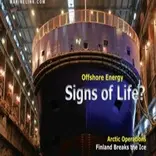Arctic Council’s Arctic Marine Strategic Plan in progress

The 2017 Progress Report on Implementation of the 2009 Arctic Marine Shipping Assessment (AMSA) Recommendations is the fourth effort by the Arctic Council’s Working Group on the Protection of the Arctic Marine Environment (PAME).
“The Arctic is changing fast. Human activity and international interest continues to grow, and at the same time the effects of climate change are becoming increasingly more visible in the Arctic. The increase in shipping activity in the Arctic still constitutes a risk to the vulnerable environment and must be met by relevant measures to reduce the risk of accidents and pollution. Joint commitment and international cooperation is an imperative for a safe, clean and sustainable development in the region. The Arctic Council’s work on safe shipping and the protection of the Arctic Ocean is more important now than ever before,” the report notes.
The report aims to document and track progress on developments in Arctic marine environment protection, maritime safety and collaboration with other international and regional Organizations, observer states and industry, in accordance with the 17 AMSA Recommendations, to promote safety and environmental protection and awareness of current and future Arctic shipping activity.
One of the main overall achievements in implementing the AMSA recommendations, especially of this biennium 2015-2017, is the adoption of the mandatory Polar Code by the International Maritime Organization (IMO). The Polar Code, which covers both maritime safety and environmental requirements, entered into force on 1 January 2017 through amendments to MARPOL and SOLAS Conventions, and is the first step to ensure robustness of ship operations in the Arctic waters.
In addition, PAME has worked to address the risks associated with the use and carriage of HFO by vessels in the Arctic for several years. Two new projects on this topic were conducted in the current period; HFO Phase IIIA “Heavy fuel Oil Releases from Shipping in the Arctic” and HFO Phase IIIB “Possible Hazards for Engines and Fuel Systems Using Heavy Fuel Oil In Cold Climate”.
Working within the Arctic Council, the Arctic States have shown that they can respond to new challenges by establishing binding cooperation. This is made particularly clear by the negotiation of legally binding agreements, such as the Arctic Search and Rescue Agreement and the Arctic Oil Spill Preparedness and Response Agreement. Two important milestones in the Arctic Councils work towards sustainable developments in the Arctic.
“Looking forward – many challenges remain and new ones are emerging with regard to ship operations in the Arctic. We will see continuous increase in the Arctic shipping activities and it is only through good international cooperation that we can properly address and find future solutions.”
On 6 November 2017, the Arctic Council will host a session entitled, “The global implications of a rapidly-changing Arctic,” at the COP23 meeting in Bonn, Germany.















![AIRBUS A380 [MORE THAN 600 PASSENGER’S CAPACITY PLANE]](https://cdn.tinn.ir/thumbnail/4jCp4EQvCU0b/IjHVrSYQrIAqIzXuTzADR7qLYX4idQT4nfq__26E5SCUPLMqfhWkWajvuO9Wfq1ql1TjV4dhkrHliNQU82kMpo2NNftT_NGEwHc9KXtN_rk731bmifa2IQ,,/airbus-a380-structure1.jpg)

Send Comment